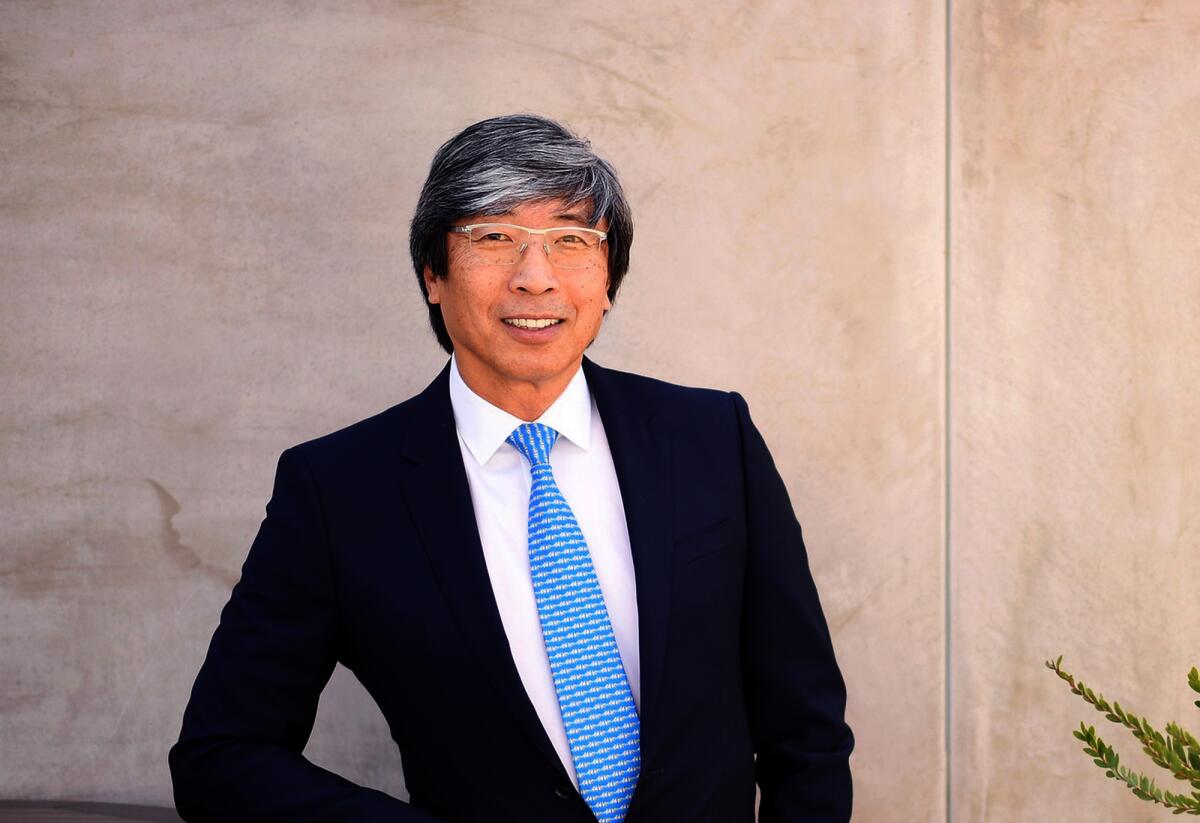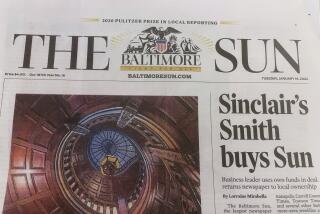Controversial hedge fund Alden Global wins bidding for Chicago Tribune, N.Y. Daily News
After the failure of an 11th-hour push to find an alternative buyer, Tribune Publishing shareholders on Friday approved the $633-million sale of the newspaper chain to the New York hedge fund Alden Global Capital.
Long before the deal was announced in mid-February, local news proponents had been scrambling to recruit investors to buy the nine newspapers, including the Chicago Tribune, New York Daily News and Orlando Sentinel. The hedge fund is known for hollowing out newsrooms to boost profits.
Tribune Publishing union members held rallies and lobbied Dr. Patrick Soon-Shiong, the second-largest Tribune shareholder and owner of the Los Angeles Times, to help finance the buyout or use his shares to block Alden’s bid.
Soon-Shiong did not cast a vote, his spokesperson Hillary Manning said.
There was immediate confusion over whether Soon-Shiong’s nonparticipation tipped the vote in favor of Alden. Tribune Publishing said late Friday the deal was approved by holders of more than 80% of the shares not owned by Alden — exceeding the two-thirds minimum that had been required. Tribune noted that “one of the company’s largest shareholders” had returned signed ballots without checking any of the three boxes “for,” “against” or “abstain.”
“Proxies submitted without a checked box were voted in favor of approval of the merger agreement,” the company said.
Tribune Publishing Chairman Philip G. Franklin said in a statement: “Today’s results represent an important milestone in completing the transaction, and we appreciate the strong support we received from Tribune stockholders.”
Alden offered $17.25 a share in cash, making Soon-Shiong’s Tribune stake worth about $150 million.
Alden already was the company’s largest shareholder. The firm already owns more than 70 dailies across the country, including the Orange County Register, Long Beach Press-Telegram and Los Angeles Daily News. The Alden deal is expected to close May 25, and the Tribune assets will once again be privately held.
“Local newspaper brands and operations are the engines that power trusted local news in communities across the United States,” Heath Freeman, president of Alden Global Capital, said in a statement. “The purchase of Tribune reaffirms our commitment to the newspaper industry and our focus on getting publications to a place where they can operate sustainably over the long term.”
Ultimately, the last-ditch rescue effort was doomed by a lack of investors to buy the biggest paper — the Chicago Tribune.
“It’s disappointing and sad that a major local investor or investor group hasn’t come forward,” Tim Franklin, a former high-level editor at the Tribune and senior associate dean at Northwestern’s Medill School of Journalism near Chicago, said this week. “In some ways, it’s confounding. ... Chicago is one of the financial centers in the U.S. — there is a lot of money in this city.”
Several factors discouraged potential investors, Franklin and other Chicago media veterans said. Chief among them was a history of bloodletting at Tribune papers — weakening the product — and dim financial prospects. Newspaper companies have been losing print advertisers and subscribers for more than a decade, and sales of digital subscriptions haven’t come close to replacing the revenue that has been lost.
“All of these publications became overly reliant on print revenue — advertising and circulation — and that money has just dried up,” said Chris Fusco, former executive editor of the Chicago Sun-Times.
In addition, the vast majority of online advertising dollars flow to Google and Facebook.
“A lot of people in town view this as a very challenging business, and it’s difficult to see a path forward,” said Jim Kirk, publisher and executive editor of Crain’s Business in Chicago. (Kirk previously served as editor in chief of The Times.) “There’s not an obvious business model for a metro of this size, except perhaps as a nonprofit or a newish all-digital format.”
Tribune newsroom guilds said in a statement: “Tribune Publishing shareholders voted to put profit and greed over local news in our country. While we are saddened by the turn of events, we know that our work over the past year — to build allies in the community and to raise awareness about Alden — is not in vain.”
The L.A. Times Guild executive committee said: “We vehemently disagree with [Soon-Shiong’s] stated rationale for not intervening in the Alden takeover vote of Tribune Publishing.... When investors are passive, the vultures are active.”
Billionaires have thrown a lifeline to other struggling outlets in recent years. Amazon founder Jeff Bezos acquired the Washington Post in 2013 and financed a major newsroom expansion, and the following year billionaire Glen Taylor, owner of the Minnesota Timberwolves, bought the Minneapolis Star-Tribune. Soon-Shiong acquired The Times in 2018.
Earlier this year, Maryland hotel magnate Stewart Bainum Jr. expressed interest in his hometown paper, the Baltimore Sun, which is part of the Tribune chain. The Choice Hotels International Inc. chairman wanted to buy the Sun and the Annapolis Capital Gazette and transfer them to a nonprofit group that could keep alive those institutions.
“While our effort to acquire the Tribune and its local newspapers has fallen short, the journey reaffirmed my belief that a better model for local news is both possible and necessary,” said Bainum, chairman of Sunlight for All Institute.
Bainum had recruited Swiss billionaire Hansjörg Wyss to join his bid. Last month, the pair offered $681 million for Tribune Publishing, topping the Alden bid. Wyss, who has a home in Wyoming, wanted to restore the Chicago Tribune as a beacon of the Midwest. But, after looking at the company’s financial records, Wyss quit the effort — leaving Bainum in need of a new partner just weeks before the bidding deadline.
“Wyss pulling out was a devastating blow,” Franklin said. “Here you had a sophisticated businessman who kicked the tires, and then walked away. And it wasn’t just the loss of capital — it also was the timing.”
As Bainum struggled to find new investors, Tribune guild members turned to Soon-Shiong for help in buying the entire company or using his shares to veto the Alden deal.
“Our newsroom is still able to do great work, but it is getting harder every day,” Greg Pratt, a political reporter and president of the Chicago Tribune Guild, wrote this week in an open letter to Soon-Shiong. “We’re not asking you to buy the company, though that would be great. But we are asking you to use your power to stop Alden from consolidating its own.”
Soon-Shiong became an investor in Tribune Publishing in 2016, paying about $15 a share, with an eye toward acquiring the Los Angeles Times. Two years later, he struck a deal to buy The Times and the San Diego Union-Tribune for $500 million, returning the papers to local control. He also kept his roughly 25% stake in Tribune Publishing.
But the biomedical entrepreneur has been focused on his biological technology company, ImmunityBio, which has been developing cancer therapies and a COVID-19 vaccine. He didn’t want to take on another major publishing company, this one with 3,000 employees and operations in seven states. Tribune Publishing’s operating loss widened to $39 million for the year, up from $5 million in 2019.
“For the past several years, Tribune Publishing has been a passive investment, as he has remained focused on the leadership roles he holds across his companies,” Manning said in a statement on behalf of Soon-Shiong. “When he made the investment in 2016, he hoped it would be a pathway to local newspaper ownership in Southern California. In 2018, he and his family were proud to acquire the Los Angeles Times and San Diego Union-Tribune from Tribune Publishing, creating the California Times. Their focus is and will be on the continued rebuilding and revitalization of The Times and Union-Tribune. They remain honored to be entrusted with these storied news organizations and continue working to secure their longevity.”

Since Soon-Shiong and his wife, Michele, acquired The Times, they have replenished the newsroom with an unprecedented hiring spree, and the operation has more than doubled its digital-only subscriptions to nearly 400,000. The family also hired a respected editor from ESPN, Kevin Merida, who will assume control of The Times’ newsroom as executive editor next month.
But turning around The Times has been daunting. The paper continues to lose money, a situation worsened last year amid a flight of advertisers due to the pandemic and stay-at-home orders.
Soon-Shiong’s efforts also have been complicated by Tribune Publishing’s two-decade campaign of consolidating business operations in Chicago. Instead of having teams in each market to handle ad sales, human resources and computer technology, support services were centralized in Chicago, which enabled Tribune Publishing to slash overhead costs.
After the Soon-Shiong takeover, The Times had to hire dozens of executives to carry out ad sales and other important business functions. It took two years for The Times to fully unwind its operations from Tribune.
Any investor who had wanted to pluck an individual newspaper from the group would have had the same headaches.
That’s not the case for Alden because it already has centralized its operations.
Alden, which has amassed local newspapers for more than a decade, has aggressively cut costs and laid off staff.
Through its MediaNews Group, Alden owns a large portfolio of news outlets in California, including the San Bernardino Sun, Riverside Press-Enterprise, Torrance Daily Breeze, Pasadena Star News, Whittier Daily News and San Jose Mercury News. Alden bought its 32% stake in Tribune in 2019.
Journalists have chafed under Alden’s ownership. Three years ago, the editorial board at Alden’s flagship, the Denver Post, called its owners “vultures” and lamented the loss of nearly two-thirds of the staff. “Here in Colorado, Alden has embarked on a cynical strategy of constantly reducing the amount and quality of its offerings, while steadily increasing its subscription rates,” the board wrote.
Earlier this year, Connecticut Atty. Gen. William Tong was so concerned about Alden’s proposed takeover of Tribune’s Hartford Courant that he sent a letter to Alden President Heath Freeman to demand information about its plan for the Tribune properties. (A spokesperson for Tong said this week the review was ongoing.)
The sale caps more than 15 years of turmoil for Tribune Publishing, which has struggled since Chicago real estate tycoon Sam Zell, who fashioned himself as the “grave dancer,” used employees’ stock plans as a vehicle to purchase the chain. Within a year of that deal, the Great Recession hit and Tribune plunged into a protracted bankruptcy proceeding.
The company’s then-ownership group, led by L.A.-based Oaktree Capital Management, began selling lucrative assets, including the papers’ prime real estate such as The Times’ art deco headquarters in downtown L.A. and the 36-story, neo-Gothic Tribune Tower in Chicago. New investors eventually joined, including tech entrepreneur Michael Ferro, who concocted an ill-conceived marketing campaign to rebrand the company under the name Tronc. Ferro later faced allegations of sexual misconduct and making antisemitic statements, which he denied, and eventually sold his stake to Alden.
Franklin said the company’s turbulent history also probably dissuaded investors.
“I think there’s a bit of exhaustion about the situation at the Tribune,” Franklin said. “Major investors like stability ... and my sense is that folks in the civic circles have concluded that this roller coaster ride has been too wild with too many sharp turns. They just decided not to get on.”
More to Read
Inside the business of entertainment
The Wide Shot brings you news, analysis and insights on everything from streaming wars to production — and what it all means for the future.
You may occasionally receive promotional content from the Los Angeles Times.











